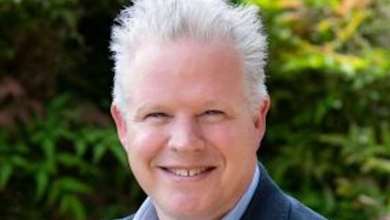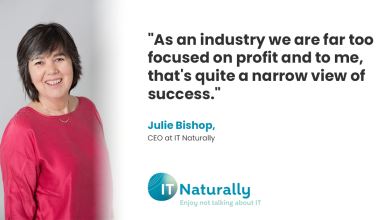
The MSP market can sometimes appear saturated, so finding ways to differentiate is the best strategy for long-term success. IT Naturally, the Cambridgeshire-based IT infrastructure MSP, has a unique blueprint that puts it in a class on its own despite being relatively new on the scene. Here, CEO Julie Bishop speaks to IT Europa Editor Carl Friedmann about how diversity and going carbon neutral are key things that make it stand out from the crowd.
Sustainability means a lot of things to a lot of people. But what was the impetus of IT Naturally to go carbon neutral? How is it a winning proposition?
When we set the company up, we considered sustainability because we wanted to be very ethical from day one and we are working to achieve B Corp Certification. Carbon neutrality is just one of the steps on that that journey. We have our carbon measured under an international standard GHG Protocol and we support a number of schemes to offset what we produce. We're a small IT company so most of the carbon we offset is actually for people traveling to and from the office, so it's one step on the journey of making sure that we are a responsible business. Not only do we offset all the carbon that we produce, but we choose suppliers, where possible, that are carbon neutral as well. That's really important to us. It’s also important having the right relationship with our suppliers and our staff. In our first assessment, we gained Investors in People silver, which is unusual for company only a couple of years old like ours, but we feel strongly that if you have the right relationship with your employees, that they enjoy coming to work, they’ll give great service. And we want them to feel really proud of our organisation.
And how do you ensure that model is, in fact, sustainable? Are you audited on a regular basis?
Absolutely. Every month, we have a spreadsheet we fill in to say what we produced, which is how we offset, and then we pay to offset that. But we’ve always given a proportion of our profits to charity, so it's far wider than just carbon neutrality to being a responsible business.
Exactly. It's a holistic approach. And just going back to making sure you're partnering with companies with the same approach or mindset, what's the responsibility of organisations to ensure that not only their practices are sustainable, but there's consistency across the entire supply chain, otherwise the whole effort suffers.
Total consistency is difficult, but where we can, we work with customers and suppliers that share our values. Sometimes you have to strike out for the right thing and then gradually, things will start shifting. When we talk to customers, a lot of them are already way down this route and often it's their IT that sticks out as the department that isn’t involved. So, we are an IT company that cares about its employees and customers and the environment, so we can bridge that gap. We also like making sure we don't buy things produced through slave labour, to help us work towards being a responsible corporation. Most of us do our bit at home to recycle and use public transport and so on, but it's actually businesses that need to make the big shift. We're the big polluters.
And again, how is company culture considered to maintain the standards for this approach to sustainability and carbon neutrality?
It's massive for us. It's vital that our people feel valued, for example everyone in the company has exactly the same benefits, like healthcare and life insurance. Everybody has a voice and certainly in our industry, where we have people on the phones all the time, they're the ones who really matter, talking to our customers. We have no paper or a printer policy —we don't print anything. There’s also an employee forum where people from various parts of the organisation can discuss anything. Like every company, we've been wrestling with hybrid working, realising that certain tasks are much better done together while some technical ones are best done in a quiet room. So, we'll write a draft policy, work with the employee forum to get feedback and then find a solution that works best for everybody. That's where we're looking after each other. We're a company of people who can go home proud.
It sounds like a win-win. And with your sustainability program, what kind of measurement tools do you have in place to gauge success and describe how staff has responded and become more conscientious?
We're a very young company, so we're just starting to put in measurements for the company. The first year was just getting through and setting up, and then Covid hit. Then we put in place ISO 9,001, ISO 27,001 and invested in people, so we're looking at our measurements every month.
There's a lot of talent that gets overlooked because companies search for certain criteria or results from automated CV software. What challenges in recruitment do you face to ensure you remain diverse but also that you attract the best talent? How do you strike that balance?
We try to promote from within wherever we can, and we'll invest in technical training to move from service to technical if that's what people want to do. But obviously, it varies from person to person. But we found it's really inspirational to others when they see one of their colleagues get a role. Obviously, though, we need skills at times that aren't available internally.
I saw on a recent DataSolutions survey that 10% of channel respondents in the UK say they had lost a contract or tender because they couldn't demonstrate sustainability pedigree. How much of a liability would it be if you couldn’t demonstrate sustainability credentials?
I think certainly for government contracts, it's really important to have the right policies in place. For us, it's not a tick box. It might shape a bit of our development plans or the order of things to ensure we're going for government contracts, but the bottom line is we don't work with people we wouldn't feel comfortable working with. So, there's a number of times when things have come our way and we've passed. We self-exclude in light of the big picture.
It's a good position to be in, to be able to do that to make sure it fits the ethos of the company, otherwise it’s always going to run its course if things aren't aligned properly.
When your values aren't aligned, you can solve the money problem and the service problem, but you can't solve the value problem, and that’s what’s most important.
Just switching gears to another big topic: diversity. How do you define diversity at IT Naturally, and how is it an integral component of the culture there?
Diversity is really valuing everybody for what they bring. We don't have set diversity targets because we're very small and we don't have turnover. We’re very representative of our area, so by ethnicity, that's working for us. And we’re very diverse in age, education and socio economic backgrounds. The area that we're not as diverse as we’d like to be is gender. We work hard on ensuring that our adverts are worded in a way that people feel welcome to apply whatever gender they are. We’re representative of our industry with gender, but we want to be better. We’ve been planning, but it hasn't been possible the last couple of years to do, workshops for girls from local schools, so hopefully by this summer, that kind of thing will happen. We need to bring women in at all levels.
Can you list the actual benefits of having a diverse workforce?
If everybody is the same, it's just an echo chamber. You don't learn anything. I know a lot more about gaming than I used to because I learn it from the youngsters. Certainly a lot of the social responsibility stuff is really strong in the younger generation and they're really teaching us loads about that. One thing that's really enjoyable is watching the relationships when people are mentored and wanting to get into positions. That's where we get massive benefits from people having tons of experience. We've also had people come in who don't have IT experience but fantastic customer service experience, so they bring loads to us as a company too. So diversity always adds something positive. But there's still a little leg pulling, particularly when some of the mature members like me just haven't got a clue what some of the youngsters are talking about.

